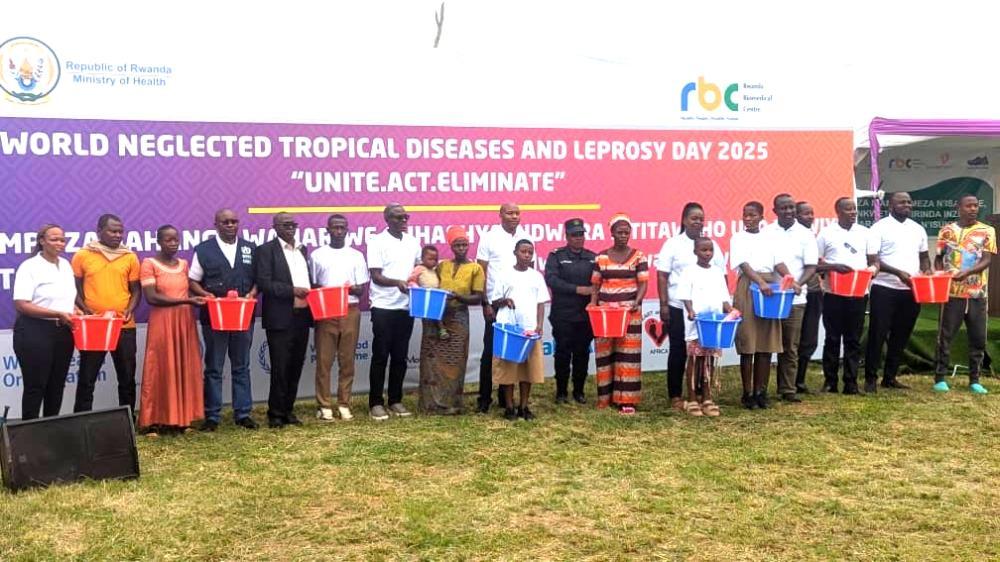Eric Niyongira
Africa-Press – Rwanda. Anyone who grew up in any rural village in Rwanda is familiar with intestinal worms. During my training as a medical doctor, I learned intestinal worms, also called soil-transmitted helminths, are one of 21 diseases classified by the World Health Organization as Neglected Tropical Diseases (NTDs).
As the name implies, NTDs are referred to as ‘neglected’ because, historically, they have gotten less attention, funding, and other necessary measures to eradicate them. They are naturally associated with poor hygiene and poverty.
They majorly thrive in impoverished communities, most lacking access to water, sanitation, and health literacy.
Rwanda has set various interventions to fight nine diseases under NTDs that are still prevalent in Rwanda: soil-transmitted helminthiasis, Schistosomiasis, taenia/cysticercosis, scabies, podoconiosis, leprosy, tungiasis/Jigger disease, snake bite envenoming and Rabies.
Among this group of diseases, Rwanda has prioritized soil-transmitted helminths (worms) and Schistosomiasis (bilharzia) because they are more prevalent across all districts and their effects on health.
The 2020 impact assessment across the country showed that the intestinal worms affected 30.2 % of children aged 1 to 4 years, 38% of 5 to 15 years old, and 46.1% of adults above age 16. The overall prevalence was 38.7%.
Looking at Schistosomiasis, since it is closely related to contamination from water bodies, the mapping indicated that the disease is still prevalent in 1013 cells, with an overall prevalence of 1.7%.
Intestinal worms affect children severely. They suffer chronic abdominal pain, fatigue, and poor nutrient absorption despite sufficient food uptake which impairs their physical and mental development.
Community engagement in the elimination of NTDs
Although the Rwandan government’s strategy to eliminate the prevalent NTDs by 2030 is promising, the road towards elimination cannot entirely rely upon medications and health infrastructure alone. It must be led and driven by those who are most affected.
While the mass drug administration (MDA) mainly carried out during the Ministry of Health’s Biannual Maternal and Child Health Week has contributed to reducing intestinal worms and schistosomiasis prevalence, the numbers are still worrisome, calling for action.
One of the most needed interventions is meaningful community engagement. Communities should not be just passive recipients of health services. They are crucial partners whose perspectives determine whether disease elimination efforts will succeed or fail.
For instance, after a successful MDA during Maternal and Child Health Week, echoes of misunderstanding linger, rumors of side effects, and misconceptions about treatment efficacy quickly spread among families. The outcome is discouraged parents and a reduction in long-term compliance with MDA.
In rural Rwanda, community members often know about local environments, behaviors, and social norms. External experts or policymakers could not easily bring such insights. Therefore, collaboration with community health workers, schoolteachers, local faith leaders, and opinion leaders is paramount in adopting the intervention.
Think of community health workers walking door-to-door in places like Ruhango or Bugesera making health follow-up visits; they don’t just deliver pills but give trust, hope, understanding, and renewed dignity.
Consider a teacher at a local school discussing hygiene and deworming. Their familiarity and well-perceived role amplify messages more accurately and powerfully than any radio advert could.
Or talk of a farmer in a marshland who just adopted improved sanitation practices after participating in a community-led dialogue, not because someone told them to but because they helped shape the conversation.
To eliminate neglected tropical diseases in Rwanda, we must move beyond simply raising awareness and bringing community ownership into reality. Fundamental, practical changes that are compelling call for strategies deeply rooted in local perspectives and lived experiences.
Integrating social behavior change approaches ensures that messages resonate and inspires communities to listen and take an active role in leading execution of prevention programs.
Eliminating NTDs in Rwanda requires engaging the people at the heart of the problem and placing them at the center of the solution. Actual public health progress flourishes when the affected shape solutions fit for them.
Their voices, leadership, and trust, not just medicines and top-to-bottom interventions, will determine Rwanda’s success in defeating neglected tropical diseases.
Source: The New Times
For More News And Analysis About Rwanda Follow Africa-Press






